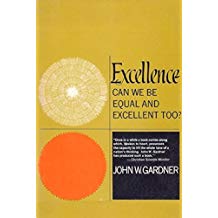One book I reread every year is “Excellence, Can We Be Equal And Excellent Too?” by John Gardner. It was published in the early 60’s and is one of the most profound modern philosophy books I’ve read. A mentor recommended it to me, I reread it every year.
One line I’ve highlighted is: “Do not let form triumph over substance.”
As we kick off a new calendar year, it seems appropriate to revisit this concept. Virtually every sales leader and organization I encounter is doing the things sales leaders and organizations should be doing. There’s the laundry list we all know: Forecast reviews, pipeline reviews, deal reviews, account/territory plans, prospecting programs, one on one’s, and so forth.
They have each invested in the tools sales organizations are supposed to invest in, including CRM, marketing automation, sales enablement platforms, and so forth.
They invest millions in sales enablement, training, sales methodologies, content, and related programs.
They have all sorts of analysis and tools to understand and manage performance.
Yet nothing changes. The data shows continued decline in the percent of sales people meeting plan. We see customers becoming increasingly reluctant to engage. We see average tenure in all sales roles plummeting to 16.5 months.
How could all this be happening if we have all the right things in place?
As I drill down in the organizations, despite having everything that should drive sales performance in place, they aren’t using them–or at least not as effectively as possible.
It seems we think that by putting these things in place, we will automatically perform. Or by going through the motions of conducting a review, performance will improve.
It seems when things don’t work as expected, once we have things in place, we revert to several behaviors:
- Doing more of all of this, faster.
- Blaming it on the people and finding new people to go through the same motions.
- Putting in place the latest miracle cure, program, technology–many of which can be helpful but will fail because we focus on form.
We focus on form, but not on the substance. We have lost sight of, or never understood, the “why” of what we are doing. We don’t coach people in “how” and “what” to do to produce results. We don’t have the courage to stick to executing what we know should work. We don’t analyze, tune, and correct things when they don’t.
Form has won!
But there’s good news. Largely, we have the right things in place. We just aren’t using them. Simply focusing on what we know is right, what we know is the right way to do those things, and consistently executing them drives results in an amazingly short time.
Rather than going through a complex process of changing, selecting and implementing something new, simply using and consistently executing the things we already have in place is faster, more effective, and cheaper.
We have to be cautious, though. We can’t do everything at once. We have to identify the highest leverage area to work on, focus on that, drive consistent execution and results, then move to the next thing.
Just because we have all the right things in place, doesn’t mean we will produce the results we expect. We have to make them work, we have to focus on consistent execution. We have to learn from our experience and take corrective action. We have to consistently improve.
Gardner captured all of this in one simple sentence, “Do not let form triumph over substance.”
Afterword: Print this in large font, tape it to the wall of your office, the bezel of your display, or something you see every day. Take a moment, as you rush from one activity to the next, to read, reflect, reset.
Afterword: We’ve developed the Sales Execution Framework as a tool to help our clients understand and implement the substance of what they already have in place. Reach out for a free whitepaper on the Sales Execution Framework (SEF).

David, very helpful, very helpful! In fact, to your point about having all the tools and not using them, I witnessed this yesterday as we had 3 CIO’s come into our sales kickoff and for 2 hours told us how they want to be sold to and I mean they got specific about how they would be more likely to respond to this method vs a phone call (which they will never answer, they told us!) and then in our very next session this “seasoned” sales person went on and on about not having the right content or messaging to talk to his clients about this particular product! I was sitting there thinking, “did you not take one note from the past 2 hours about what those CIO’s just told us?” . . . keep the info coming!